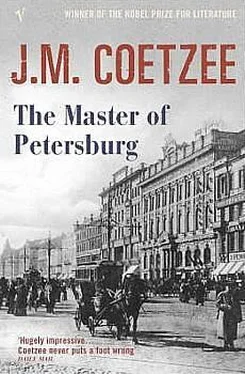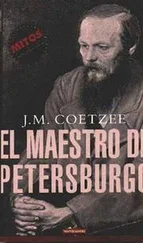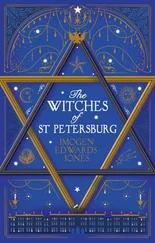Maximov takes the letter from his slack grasp and peruses it again. It is the last letter he wrote from Dresden, a letter in which he chides Pavel for spending too much money. Mortifying to sit here while a stranger reads it! Mortifying ever to have written it! But how is one to know, how is one to know, which day will be the last?
' "Your loving father, Fyodor Mikhailovich Dostoevsky," ' murmurs the magistrate, and looks up. 'So let me be clear, you are not Isaev at all, you are Dostoevsky.'
'Yes. It has been a deception, a mistake, stupid but harmless, which I regret.'
'I understand. Nevertheless, you have come here purporting – but need we use that ugly word? Let us use it gingerly, so to speak, for the time being, for lack of a better – purporting to be the deceased Pavel Alexandrov-ich Isaev's father and applying to have his property released to you, while in fact you are not that person at all. It does not look well, does it?'
'It was a mistake, as I say, which I now bitterly regret. But the deceased is my son, and I am his guardian in law, properly appointed.'
'Hm. I see here he was twenty-one, getting on for twenty-two, at the time of decease. So, strictly speaking, the writ of guardianship had expired. A man of twenty-one is his own master, is he not? A free person, in law.'
It is this mockery that finally rouses him. He stands up. 'I did not come here to discuss my son with strangers,' he says, his voice rising. 'If you insist on keeping his papers, say so directly, and I will take other steps.'
'Insist on keeping the papers? Of course not! My dear sir, please be seated! Of course not! On the contrary, I would very much like you to examine the papers, for your own sake and for ours too. The guidance you could give us would be appreciated, deeply appreciated. To begin with, let us take this item.' He lays before him a set of half a dozen leaves written on both sides, the complete list of names of which he has already seen the first page, the As. 'Not your son's handwriting, is it?'
'No.'
'No, we know that. Any idea whose handwriting it is?'
'I do not recognize it.'
'It belongs to a young woman at present resident abroad. Her name is not relevant, though if I mentioned it I think you would be surprised. She is a friend and associate of a man named Nechaev, Sergei Gennadevich Nechaev. Does the name mean anything to you?'
'I do not know Nechaev personally, and I doubt very much that my son knew him. Nechaev is a conspirator and an insurrectionist whose designs I repudiate with the utmost force.'
'You do not know him personally, as you say. But you have had contact with him.'
'No, I have not had contact with him. I attended a public meeting in Switzerland, in Geneva, at which numerous people spoke, Nechaev among them. He and I have been together in the same room – that is the sum of my acquaintance with him.'
'And when was that?'
'It was in the autumn of 1867. The meeting was organized by the League for Peace and Freedom, as the body calls itself. I attended openly, as a patriotic Russian, to hear what might be said about Russia from all sides. The fact that I heard this young man Nechaev speak does not mean that I stand behind him. On the contrary, I repeat, I reject everything he stands for, and have said so many times, in public and in private.'
'Including the welfare of the people? Doesn't Nechaev stand for the welfare of the people? Isn't that what he is striving for?'
'I fail to understand the force of these questions. Nechaev stands first and foremost for the violent overthrow of all the institutions of society, in the name of a principle of equality – equal happiness for all or, if not that, then equal misery for all. It is not a principle that he attempts to justify. In fact he seems to despise justification in general as a waste of time, as useless intellection. Please don't try to associate me with Nechaev.'
'Very well, I accept the reproof. Though I am surprised, I might add – I would not have thought of you as a martinet for principles. But to business. The list of names you see in front of you – do you recognize any of them?'
'I recognize some of them. A handful.'
'It is a list of people who are to be assassinated, as soon as the signal is given, in the name of the People's Vengeance, which as you know is the clandestine organization that Nechaev has brought into being. The assassinations are meant to precipitate a general uprising and to lead to the overthrow of the state. If you turn to the end, you will come to an appendix which names entire classes of people who are thereupon, in the wake of the overthrow, to suffer summary execution. They include the entire higher judiciary and all officers of the police and officials of the Third Section of the rank of captain and higher. The list was found among your son's papers.'
Having delivered this information, Maximov tilts his chair back and smiles amicably.
'And does that mean that my son is an assassin?'
'Of course not! How could he be when no one has been assassinated? What you have there is, so to speak, a draft, a speculative draft. In fact, my opinion – my opinion as a private individual – is that it is a list such as a young man with a grudge against society might " concoct in the space of an afternoon, perhaps as a way of showing off to the very young woman to whom he is dictating – showing off his power of life and death, his completely illusory power. Nevertheless, assassination, the plotting of assassination, threats against officialdom – these are serious matters, don't you agree?'
'Very serious. Your duty is clear, you don't need my advice. If and when Nechaev returns to his native country, you must arrest him. As for my son, what can you do? Arrest him too?'
'Ha ha! You will have your joke, Fyodor Mikhailovich! No, we could not arrest him even if we wanted to, for he has gone to a better place. But he has left things behind. He has left papers, more papers than any self-respecting conspirator ought to. He has left behind questions too. Such as: Why did he take his life? Let me ask you: Why do you think he took his life?'
The room swims before his eyes. The investigator's face looms like a huge pink balloon.
'He did not take his life,' he whispers. 'You understand nothing about him.'
'Of course not! Of your stepson and the vicissitudes of his existence I understand not a whit, nor do I pretend to. What I hope to understand in a material, investigative sense, however, is what drove him to his death. Was he threatened, for instance? Did one of his associates threaten to disclose him? And did fear of the consequences unsettle him so deeply that he took his own life? Or did he perhaps not take his life at all? Is it possible that, for reasons of which we are still ignorant, he was found to be a traitor to the People's Vengeance and murdered in this particularly unpleasant way? These are some of the questions that run through my mind. And that is why I took this lucky opportunity to speak to you, Fyodor Mikhailovich. Because if you do not know him, having been his stepfather and for so long his protector, in the absence of his natural parents, who does?
'Then, as well, there is the question of his drinking. Was he used to heavy drinking, or did he take to it recently, because of the strains of the conspiratorial life?'
'I don't understand. Why are we talking about drinking?'
'Because on the night of his death he had drunk a great deal. Did you not know that?'
He shakes his head dumbly.
'Clearly, Fyodor Mikhailovich, there is a great deal you do not know. Come, let me be candid with you. As soon as I heard you had arrived to claim your stepson's papers, stepping, so to speak, into the lion's den, I was sure, or almost sure, that you had no suspicion of anything untoward. For if you had known of a connection between your stepson and Nechaev's criminal gang, you would surely not have come here. Or at least you would have made it plain from the outset that it was only the letters between yourself and your stepson that you were claiming, nothing else. Do you follow?'
Читать дальше












